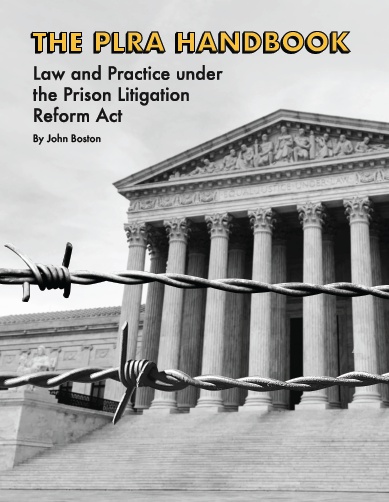PLN seeks Supreme Court review of FOIA case against U.S. Attorney's Office
Westword, Jan. 1, 2011.
http://blogs.westword.com/latestword/2011/07/dise…
PLN seeks Supreme Court review of FOIA case against U.S. Attorney's Office - Westword 2011
Disemboweling video: Will U.S. Supreme Court release prison footage of Joey Estrella slaying?
By Alan Prendergast Mon., Jul. 18 2011 at 2:29 PM
What happens in a public trial becomes public record. Except when the government says it doesn't. That little hitch in the law fuels the ongoing battle between Prison Legal News and the U.S. Justice Department over a graphic video shot inside the U.S. Penitentiary Florence in the aftermath of a gruesome inmate-on-inmate slaying -- and then screened in court for shocked jurors and reporters.
PLN, a small but feisty monthly, has been trying for years to obtain a copy of the unedited video, in keeping with its mission to expose the violence and corruption hidden behind prison walls. The government was happy to present the video in evidence when it was seeking the death penalty for cousins Rudy and William Sablan in two Denver trials, but now claims the "privacy interests" of their victim's family should outweigh any public interest in further dissemination of the video.
The case dates back to the 1999 slaying and disemboweling of inmate Joey Estrella, in what was supposed to be the most secure unit of the high-security Florence pen. Corrections officers who responded to the incident took video of Estrella's highly intoxicated cellmates, William and Rudy Sablan, displaying their victim's entrails in the cell, drinking his blood and taunting their captors. The event raised numerous questions about how the two were able to obtain the booze, sharp weapons and time to commit such a crime, as well as why staff were triple-bunking inmates in an alleged "protective custody" unit.
The Denver juries found both Sablans guilty of murder but spared them the death penalty. PLN editor Paul Wright sought the tape for his website, a legal battle that's stretched over three years and is now headed for the U.S. Supreme Court.
Last January the Tenth Circuit Court of Appeals upheld a district court's decision not to release the video, even though it was an exhibit in both trials. Wright is now petitioning the Supreme Court for review, and last week an amicus brief was filed on behalf of various supporters of his cause, including Westword and the Washington Newspaper Publishers Association.
Although at first glance the dispute may seem to be about nothing more than morbid curiosity, the case presents important questions about how far the government can go to declare something "private" after it's already been aired in open court.
Disemboweling video: Will U.S. Supreme Court release prison footage of Joey Estrella slaying?
By Alan Prendergast Mon., Jul. 18 2011 at 2:29 PM
What happens in a public trial becomes public record. Except when the government says it doesn't. That little hitch in the law fuels the ongoing battle between Prison Legal News and the U.S. Justice Department over a graphic video shot inside the U.S. Penitentiary Florence in the aftermath of a gruesome inmate-on-inmate slaying -- and then screened in court for shocked jurors and reporters.
PLN, a small but feisty monthly, has been trying for years to obtain a copy of the unedited video, in keeping with its mission to expose the violence and corruption hidden behind prison walls. The government was happy to present the video in evidence when it was seeking the death penalty for cousins Rudy and William Sablan in two Denver trials, but now claims the "privacy interests" of their victim's family should outweigh any public interest in further dissemination of the video.
The case dates back to the 1999 slaying and disemboweling of inmate Joey Estrella, in what was supposed to be the most secure unit of the high-security Florence pen. Corrections officers who responded to the incident took video of Estrella's highly intoxicated cellmates, William and Rudy Sablan, displaying their victim's entrails in the cell, drinking his blood and taunting their captors. The event raised numerous questions about how the two were able to obtain the booze, sharp weapons and time to commit such a crime, as well as why staff were triple-bunking inmates in an alleged "protective custody" unit.
The Denver juries found both Sablans guilty of murder but spared them the death penalty. PLN editor Paul Wright sought the tape for his website, a legal battle that's stretched over three years and is now headed for the U.S. Supreme Court.
Last January the Tenth Circuit Court of Appeals upheld a district court's decision not to release the video, even though it was an exhibit in both trials. Wright is now petitioning the Supreme Court for review, and last week an amicus brief was filed on behalf of various supporters of his cause, including Westword and the Washington Newspaper Publishers Association.
Although at first glance the dispute may seem to be about nothing more than morbid curiosity, the case presents important questions about how far the government can go to declare something "private" after it's already been aired in open court.







